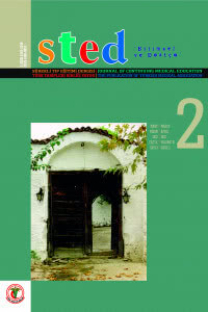Sağlık Okuryazarlığı
Health Literacy
___
- Parker, Ruth M.,Scott C. Ratzan, and Nicole Lurie. "Health literacy: a policy challenge for advancing high-quality health care." Health affairs 22.4 (2003): 147-153.
- Osborne H. Health Literacy. From A to Z. 2th Edition.Burlingt on: Jones&Bartlett; 2013.
- Balçık, Pınar Yalçın. "Sağlık Okur-Yazarlığı." TAF Preventive Medicine Bulletin13.4 (2014): 321-326.
- HLS-EU Consortıum (2012): Comparatıve Report
- Of Health Lıteracy In Eıght EU Member States. The European Health Lıteracy Survey HLS-EU. Accessed April 11, 2015, at http://www.health- lıteracy.eu.
- Safeer, Richard S.,and Jann Keenan. "Health literacy: the gap between physicians and patients." Am Fam Physician72.3 (2005): 463-468.
- Health Literacy and Child Health Promotion: Implications forResearch, Clinical Care, and Public Policy. Sudore, R. L.,Yaffe, K., Satterfield, S., Harris, T. B., Mehta, K. M., Simonsick, E. M., ... &Schillinger, D. (2006). Limited literacy and mortality in the elderly: the health, aging, and body composition study. Journal of general internal medicine, 21(8), 812.
- Güneş, F. (1994). Okur-yazarlık kavramı ve düzeyleri. Ankara Üniversitesi Eğitim Bilimleri
- Fakültesi Dergisi, 27(2), 499-507. UNESCO, 2005. EFA Global Monitoring Report
- Team. EducationforAll Global Monitoring Report Understandings of literacy, p. 147- 159. Chapter 6. Accessed April 4, 2015, at http://www.uis.unesco.org/Library/Documents/ gmr06-en.pdf.
- Sİrensen K, Van den Broucke S, Fullam J, Doyle G, Pelikan J, Slonska Z, Brand H; (HLSEU) Consortium Health Literacy Project European. Health literacy and publichealth: a systematic review and integration of definitions and models. BMC PublicHealth. 2012; 25;12:80.
- Tones, Keith. "Health literacy: new wine in old bottles?." Health Education Research17.3 (2002): 290.
- Health and Literacy: A Review of Medical and PublicHealth Literature Volume 1: Chapter Five Rima E. Rudd ,Barbara A. Moeykens.
- 13. World Health Organization. "Health promotion glossary." (1998). Accessed March 12, 2015, at http://www.who.int/healthpromotion/about/ HPR%20Glossary%201998.pdf.
- 14.Nancy D. Berkman , Terry C. Davis&LaurenMcCormack (2010) Health Literacy: What Is It?,Journal of Health Communication: International Perspectives, 15:S2, 9-19.
- 15.Kickbusch, Ilona. "Improving Health Literacy-A key priority for enabling good health in Europe." EuropeanHealth Forum Gastein. Vol. 2004.
- 16.Jolie N. Haun , Melissa A. Valerio , Lauren A. McCormack , Kristine Sørensen& Michael K. Paasche-Orlow (2014) Health Literacy Measurement: An Inventory and Descriptive Summary of 51 Instruments, Journal of Health Communication: International Perspectives, 19:sup2, 302-333.
- 17.DeWalt, D. A.,&Hink, A. (2009). Health literacy and child health outcomes: a systematic review ofthe literature. Pediatrics, 124(Supplement 3), S265-S274.
- 18.Baker, D.W. The meaning and measure of healthliteracy. Journal of General Internal Medicine 21; 2006: 878-883
- 19.Tanrıöver, M. D., Yıldırım, H. H., Ready, F. N. D., Çakır, B., & Akalın, H. E. (2014). Sağlık Okuryazarlığı Araştırması.20.SEZGİN, Deniz. "Sağlık Okuryazarlığını Anlamak." Galatasaray Üniversitesi İletişim Dergisi (2013): 73-92
- 21.Kutner, Mark, et al. "TheHealth Literacy of America'sAdults: Results from the 2003 NationalAssessment of Adult Literacy. NCES 2006-483." National Center for Education Statistics (2006).
- 22.IOM. (2004). Health Literacy - A Prescription toEnd Confusion. Institute of Medicine (IOM), TheNational Academies Press, Washington, DC.
- 23.Von Wagner, Christian, et al. "Functional health literacy and health-promoting behaviour in a national sample of British adults." Journal of epidemiology and community health 61.12 (2007): 1086-1090.
- 24.Bilir, Nazmi. "Sağlık okur-yazarlığı/Health Literacy."Turkish Journal of PublicHealth 12.1(2014):61-68.
- 25.US Department of Health and Human Services, and Office of Disease Prevention and Health Promotion. "National action plan to improve health literacy." Washington, DC (2010).
- 26.World Health Organization. "Health literacy: the solid facts. 2013. Accessed April 27,2015, at http://www. euro. who. int/__data/ assets/ pdf_file/0008/190655/e96854.pdf.
- 27.Schillinger, D.,Grumbach, K., Piette, J., Wang, F., Osmond, D., Daher, C., &Bindman, A. B. (2002). Association of health literacy with diabetes outcomes. Jama, 288(4), 475-48
- ISSN: 1300-0853
- Yayın Aralığı: 6
- Başlangıç: 1992
- Yayıncı: -
Ebru KARACA, FİLİZ MİNE ÇİZMECİOĞLU, Onur HAMZAOĞLU
Bir Kredi Yurtlar Kurumunda Kalan Kız Öğrencilerin Genital Sağlık Durumu ve Etkileyen Faktörler
NAZAN GÜRARSLAN BAŞ, GÜLNAZ KARATAY, DUYGU ARIKAN
5e Öğrenme Modeline Uygun Tasarlanan "Kanser Hastalarında Palyatif Bakım" Stajının Değerlendirilmesi
Kürşat Volkan ÖZCAN, İSMAİL OKAN, MUSTAFA SÜREN
Yaşlılarda Besin İlaç Etkileşimi
FUAT NİHAT ÖZAYDIN, Funda ŞENSOY, AYŞE NİLÜFER ÖZAYDIN
